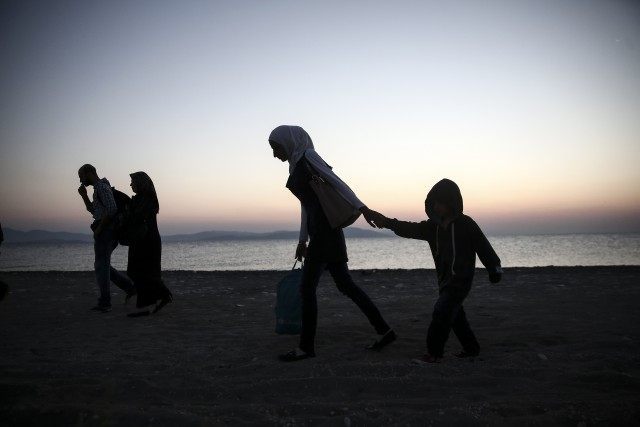KOS, Greece (AP) — Dozens of people from the Middle East reached the Greek island of Kos from nearby Turkey Wednesday, joining thousands already camped in wretched conditions on what is normally a tourist playground known for its sun and beaches.
Overwhelmed and unprepared for the unprecedented influx, authorities on the eastern Aegean Sea island have been heavily criticized for their treatment of the migrants — mostly refugees from Syria.
At least two rubber boats made landfall just before dawn in the Psalidi coastal area, and dozens of men, women and children set off on the four-kilometer (2.5-mile) trudge to the island capital of Kos.
Their first question was where they had landed — which provoked strong laughter as Kos has an obscene meaning in Arabic.
“I feel good to be here, but I still miss my family” in Syria, said Omar Mohammad, a 25-year-old English literature graduate from Aleppo.
He said the three-hour crossing from Turkey was his third attempt to reach Greece in four days. On two occasions, Turkish officials had prevented him from leaving.
Shortly later, an Italian patrol boat participating in a European border watch mission brought in about 50 people rescued at sea — tying up beside dozens of long inflatable dinghies seized by the coast guard.
Struggling with its worst postwar financial crisis, Greece has been overwhelmed by the wave of refugees and economic migrants, more than 125,000 of whom have reached the eastern Aegean islands this year — a 750 percent increase over 2014.
The country is Europe’s main entry point for people arriving by sea, as the alternative route from north Africa to Italy has become increasingly dangerous due to fighting in Libya. From Greece, the migrants move north through the Balkans, hoping to gain asylum, preferably in Germany, the Netherlands or Scandinavia.
“Aleppo is the worst city in the world,” said Dirar, another English graduate who made the crossing with Mohammad’s group. “There’s no electricity, no water, no Internet. My home was destroyed by a rocket blast,” he said, showing a picture on his mobile phone of himself in the wreckage.
“I was so happy to be alive that I took a selfie,” he said. “From Greece, I will travel through Macedonia, Serbia and Hungary to Germany.”
But first, those reaching the islands have to be registered by Greek authorities to get necessary travel documents. Huge backlogs caused by the sheer number of arrivals and lack of official preparedness have trapped thousands on Kos, waiting for the papers that will secure them a berth on an Athens-bound ferry.
For the past two days, Kos authorities have been evicting refugees sleeping rough in parks and streets, locking them in an old football stadium that is the island’s main registration center. Many women and young children are among those interned in a sunbaked waste without shade or hygiene facilities.
“The situation here is very bad and police here they beat a boy, they beat a man, they beat children, it’s too bad,” Syrian refugee Laith Saleh, who is in the stadium, told The Associated Press by phone Wednesday. “We can’t go out.”
Doctors Without Borders, the medical charity also known as Medecins sans Frontieres, criticized Greek authorities after police in the stadium used fire extinguishers and batons Tuesday to break up a crowd jostling for papers.
“MSF is very worried about how the situation is evolving in Kos,” MSF director of operations Brice de le Vingne said late Tuesday. “What was previously a situation of state inaction is now one of state abuse, with police using increasing heavy-handed force against these vulnerable people.”
Municipal officials weren’t available to comment Wednesday, but have long been lobbying for the refugees to be taken to the mainland. Mayor Giorgos Kyritsis has pledged to get them off parks and public areas.
MSF, which is providing medical assistance to refugees, said more than 7,000 people arrived in Kos in July.
De le Vigne said Kos authorities believe that offering no better living conditions will deter migrants from heading for the island.
“But the truth is that people fleeing war will keep on coming whether or not the authorities are trying to stop them from doing so,” he said. “One is left to wonder what more the Greek authorities need to rise up to the occasion, take their responsibilities and receive these people humanely and with dignity.”

COMMENTS
Please let us know if you're having issues with commenting.